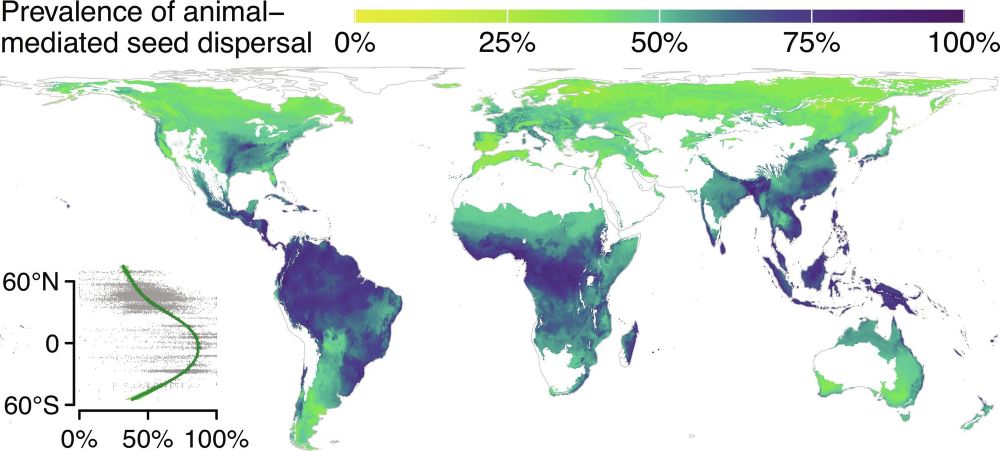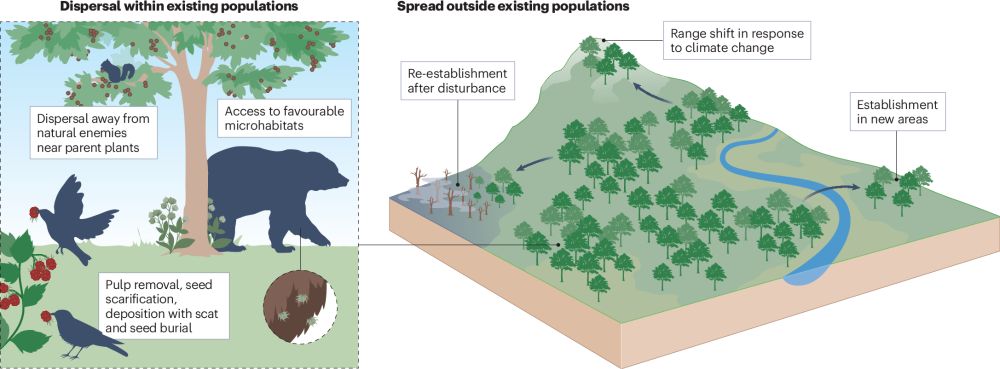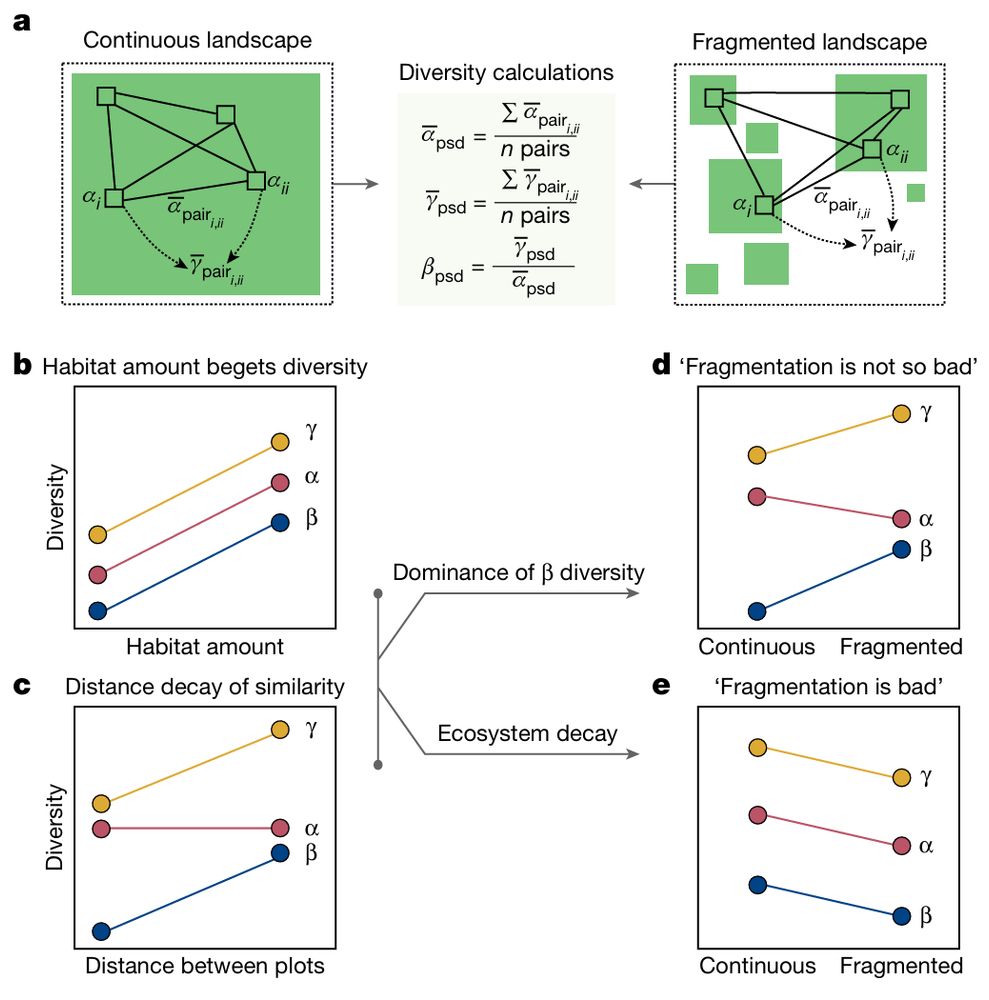
@georgeporton.bsky.social
Research Assistant at University of Leeds working on ecological restoration in the uplands
Reposted
New OA publication from TreE_PlaNat project @uktreescapes.bsky.social in Ecological Solutions and Evidence: Creating woodland through natural processes: Current understanding and knowledge gaps in Great Britain besjournals.onlinelibrary.wiley.com/doi/10.1002/...

Creating woodland through natural processes: Current understanding and knowledge gaps in Great Britain
Natural colonisation can successfully create structurally diverse, locally adapted woodlands in Britain, but the outcomes of this process can vary considerably. Combining natural colonisation and tre...
besjournals.onlinelibrary.wiley.com
October 23, 2025 at 7:08 AM
New OA publication from TreE_PlaNat project @uktreescapes.bsky.social in Ecological Solutions and Evidence: Creating woodland through natural processes: Current understanding and knowledge gaps in Great Britain besjournals.onlinelibrary.wiley.com/doi/10.1002/...
Reposted
For 101 years, ecologists have sought to explain the 3-4 years multi-annual cycles of voles and lemmings. In our paper, doi.org/10.1073/pnas..., we find that Density-dependent recruitment, but not survival drives cyclic dynamics in a field vole population, overturning accepted wisdom.

October 5, 2025 at 3:26 PM
For 101 years, ecologists have sought to explain the 3-4 years multi-annual cycles of voles and lemmings. In our paper, doi.org/10.1073/pnas..., we find that Density-dependent recruitment, but not survival drives cyclic dynamics in a field vole population, overturning accepted wisdom.
Reposted
🦜Animal loss is stalling tropical forest recovery
A new study shows that when seed-dispersing animals decline, tropical forests regrow slower, cutting carbon gains by over 50%.
Biodiversity loss is a climate issue.
🔗 www.pnas.org/doi/abs/10.1...
#SciComm #Biodiversity #ClimateCrisis 🧪
A new study shows that when seed-dispersing animals decline, tropical forests regrow slower, cutting carbon gains by over 50%.
Biodiversity loss is a climate issue.
🔗 www.pnas.org/doi/abs/10.1...
#SciComm #Biodiversity #ClimateCrisis 🧪

Seed dispersal disruption limits tropical forest regrowth | PNAS
Identifying linkages between biodiversity loss and climate change is required for
understanding the scope of these interconnected challenges and de...
www.pnas.org
August 1, 2025 at 10:17 AM
🦜Animal loss is stalling tropical forest recovery
A new study shows that when seed-dispersing animals decline, tropical forests regrow slower, cutting carbon gains by over 50%.
Biodiversity loss is a climate issue.
🔗 www.pnas.org/doi/abs/10.1...
#SciComm #Biodiversity #ClimateCrisis 🧪
A new study shows that when seed-dispersing animals decline, tropical forests regrow slower, cutting carbon gains by over 50%.
Biodiversity loss is a climate issue.
🔗 www.pnas.org/doi/abs/10.1...
#SciComm #Biodiversity #ClimateCrisis 🧪
Reposted
Pollinator decline has captured global attention, but another plant-animal mutualism is quietly unraveling.
Our new Nature Reviews Biodiversity article synthesizes global evidence on seed disperser decline and what it means for plant biodiversity, ecosystem recovery, and climate adaptation. 🧵
Our new Nature Reviews Biodiversity article synthesizes global evidence on seed disperser decline and what it means for plant biodiversity, ecosystem recovery, and climate adaptation. 🧵

Drivers and impacts of global seed disperser decline
Nature Reviews Biodiversity - Many plants rely on animals to disperse their seeds, but some groups of these seed-dispersing animals are facing severe declines. This Review summarizes evidence of...
rdcu.be
May 19, 2025 at 1:35 AM
Pollinator decline has captured global attention, but another plant-animal mutualism is quietly unraveling.
Our new Nature Reviews Biodiversity article synthesizes global evidence on seed disperser decline and what it means for plant biodiversity, ecosystem recovery, and climate adaptation. 🧵
Our new Nature Reviews Biodiversity article synthesizes global evidence on seed disperser decline and what it means for plant biodiversity, ecosystem recovery, and climate adaptation. 🧵
Reposted
New key finding:
Landscapes of fragmented habitat have lower diversity, at all scales, than do unfragmented landscapes.
Habitat fragmentation does not compensate for the loss of local (alpha) diversity by increasing the diversity among fragments (beta diversity).
www.nature.com/articles/s41...
Landscapes of fragmented habitat have lower diversity, at all scales, than do unfragmented landscapes.
Habitat fragmentation does not compensate for the loss of local (alpha) diversity by increasing the diversity among fragments (beta diversity).
www.nature.com/articles/s41...

March 13, 2025 at 3:06 PM
New key finding:
Landscapes of fragmented habitat have lower diversity, at all scales, than do unfragmented landscapes.
Habitat fragmentation does not compensate for the loss of local (alpha) diversity by increasing the diversity among fragments (beta diversity).
www.nature.com/articles/s41...
Landscapes of fragmented habitat have lower diversity, at all scales, than do unfragmented landscapes.
Habitat fragmentation does not compensate for the loss of local (alpha) diversity by increasing the diversity among fragments (beta diversity).
www.nature.com/articles/s41...
Reposted
📣 We have a fully-funded #PhDopportunity, part of the #QUARTILES doctoral landscape award, focussing on spatial variation in natural tree regeneration in grazed UK uplands.
Combine fieldwork, GIS & modelling to tackle #biodiversity challenges 🍃
Apply now: bit.ly/4hrwXAq
Combine fieldwork, GIS & modelling to tackle #biodiversity challenges 🍃
Apply now: bit.ly/4hrwXAq

QUARTILES DLA: Mechanisms of spatial variation in natural tree regeneration in grazed UK uplands at University of Aberdeen on FindAPhD.com
PhD Project - QUARTILES DLA: Mechanisms of spatial variation in natural tree regeneration in grazed UK uplands at University of Aberdeen , listed on FindAPhD.com
bit.ly
January 22, 2025 at 2:27 PM
📣 We have a fully-funded #PhDopportunity, part of the #QUARTILES doctoral landscape award, focussing on spatial variation in natural tree regeneration in grazed UK uplands.
Combine fieldwork, GIS & modelling to tackle #biodiversity challenges 🍃
Apply now: bit.ly/4hrwXAq
Combine fieldwork, GIS & modelling to tackle #biodiversity challenges 🍃
Apply now: bit.ly/4hrwXAq
Reposted
Useful new paper on natural colonisation:
Natural colonization in abandoned agricultural fields benefits native, insect-pollinated and bird-dispersed woody species
doi.org/10.1016/j.tf... #ForestEcology #rewilding
Natural colonization in abandoned agricultural fields benefits native, insect-pollinated and bird-dispersed woody species
doi.org/10.1016/j.tf... #ForestEcology #rewilding

December 20, 2024 at 4:46 PM
Useful new paper on natural colonisation:
Natural colonization in abandoned agricultural fields benefits native, insect-pollinated and bird-dispersed woody species
doi.org/10.1016/j.tf... #ForestEcology #rewilding
Natural colonization in abandoned agricultural fields benefits native, insect-pollinated and bird-dispersed woody species
doi.org/10.1016/j.tf... #ForestEcology #rewilding
Reposted
A major challenge in restoration ecology is the widespread belief that there is a correct natural community for any given location, and that identifying it is the first step in recreating it. 1/6

December 19, 2024 at 8:58 AM
A major challenge in restoration ecology is the widespread belief that there is a correct natural community for any given location, and that identifying it is the first step in recreating it. 1/6

